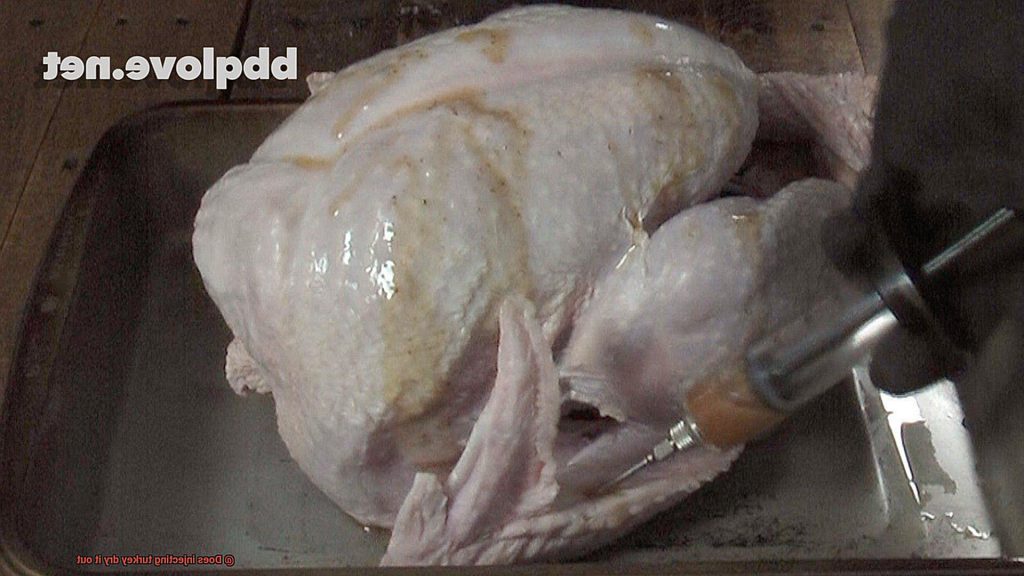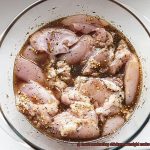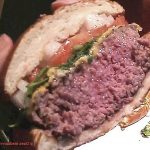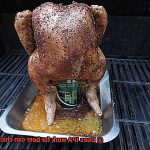Thanksgiving is almost here, and you know what that means – it’s time to talk turkey. As the centerpiece of the holiday feast, getting that bird just right is essential. And one question that often comes up in turkey prep discussions is whether injecting turkey dries it out.
Injecting has become a popular method for adding flavor and moisture to turkey, but some folks worry that it might have a negative impact on texture. The truth is, there’s no easy answer to this question. Factors like the type and amount of injection, cooking method, and temperature all play a role in determining whether or not injecting will dry out your bird.
But fear not. In this blog post, we’re going to delve into the science behind injecting turkey and explore both the pros and cons of this method. We’ll also share tips for achieving optimal results so you can impress your guests with a juicy, flavorful bird. Whether you’re an experienced cook or a newbie to turkey prep, keep reading to learn more about the ins and outs of injecting turkey.
Contents
What is Injecting?
Injecting is a remarkable cooking technique that has become increasingly popular in recent years. It involves using a marinade or brine solution to add flavor and moisture to meat, particularly large cuts like turkeys. The process of injecting is simple and involves using a needle to inject the liquid solution directly into the meat, making it more succulent and juicy.
One of the benefits of injecting is that it allows the meat to retain moisture during cooking, preventing it from drying out. This results in flavorful, moist meat that your guests will love. The marinade or brine solution can be made up of different ingredients such as spices, herbs, fruit juices, vinegar or wine, depending on your preference.
It is important to note that injecting should not be used as a substitute for proper cooking techniques. Injected meat must still be cooked thoroughly to ensure that it is safe to eat. Over-injecting can result in an overly salty or strong flavor that may not be desirable. Therefore, it’s essential to use the right type of injection and be mindful of how much you are using.
When using injection marinades, it’s crucial to select the appropriate type for your meat. A simple salt-based brine will help your meat retain its moisture and flavor. However, if you’re using an injection that contains acids such as vinegar or citrus juice, there’s a risk of over-marinating, which can lead to dry spots in the meat.
Types of Injections
Turkey is a popular dish, especially during holidays and celebrations. Injecting turkey with different types of injections can add flavor, moisture, and tenderness to the meat, making it even more enjoyable. There are three most common types of injections that can be used: brine, marinade, and butter-based injections. Each injection type has a unique taste and purpose.
Brine injections involve injecting a mixture of water, salt, and other seasonings into the turkey. This type of injection can help to enhance the natural flavor of the turkey and keep it moist during cooking. Brining also helps to tenderize the meat and make it more juicy.
The salt in the brine solution helps to break down the proteins in the meat, allowing it to retain more moisture during cooking. Brine injections have a subtle taste that enhances the turkey’s natural flavor without overpowering it.
Marinade injections involve injecting a flavored liquid into the turkey. This liquid can contain a variety of ingredients, such as vinegar, citrus juice, herbs, and spices. Marinades can add a depth of flavor to the turkey and help to keep it moist during cooking. The acid in the marinade helps to break down the fibers in the meat, making it more tender. Marinade injections have a strong taste that can overpower the natural flavor of the turkey if not properly balanced.
Butter-based injections involve injecting melted butter or other fats into the turkey. This can add richness and flavor to the meat as well as help to keep it moist during cooking. Butter-based injections are often used in conjunction with other types of injections to provide a well-rounded flavor profile. The fat in the butter helps to keep the meat moist while also adding a luxurious touch to the flavor profile.
It’s important to note that injecting turkey does not necessarily dry it out. In fact, properly injecting a turkey can help to keep it moist and tender during cooking. The key is to use the right combination of injection ingredients and to inject the turkey in the right places to ensure even distribution of flavor and moisture. Injecting too much liquid or injecting it in the wrong places can lead to uneven cooking and potentially unsafe meat.
Does Injecting Dry Out the Turkey?
Injecting your bird with marinade or brine is a popular method to achieve this mouthwatering goal. However, some may worry that injecting the turkey may actually dry it out. When done correctly, injecting your turkey can actually add moisture and flavor to the meat.
The secret to success is using a high-quality injection solution that contains ingredients that will help retain moisture in the meat, such as salt, sugar, and acidic liquids like vinegar or citrus juice. These ingredients will infuse the meat with delectable flavors and ensure that it stays moist during cooking.
To inject your turkey evenly and thoroughly, use a meat injector and strategically place the needle in various parts of the bird. This will ensure that the solution reaches all parts of the meat and creates an even distribution of flavor.
It’s essential not to overdo it with the injection solution. Too much liquid can cause the meat to become waterlogged and lose its natural texture. So be sure to use just enough solution to add flavor and moisture without overdoing it.
Factors to Consider When Injecting a Turkey
Preparing a perfectly moist and juicy turkey requires careful consideration of several factors when injecting the bird. The injection solution is the first aspect to consider. While solutions with salt, sugar, and acidic liquids can enhance flavor and moisture content, excessive salt can draw out moisture from the meat and cause dryness. Always opt for a poultry-specific solution that contains ingredients that will help keep the meat moist.
Timing is also crucial. If the injection solution is added too early in the cooking process, it can lead to excess moisture and a mushy texture. Conversely, if done too close to the end of cooking, the injection may not fully penetrate the meat to provide desired flavor and moisture. Therefore, strictly follow recommended usage guidelines.
The size and weight of the turkey also play a role in how it will react to being injected. A larger bird may require multiple injections to ensure even distribution of the solution throughout the meat. Make sure to inject evenly, taking care not to over-inject any one area.
Finally, consider how you plan to cook your turkey after it has been injected. High-heat cooking methods like grilling or frying can cause the injection solution to evaporate quickly, leaving your turkey dry. On the other hand, lower-heat cooking methods like roasting or smoking allow more time for the solution to permeate the meat and provide moisture.
Benefits of Injecting a Turkey
Injecting your turkey may be the solution to your culinary woes. As a seasoned expert on the benefits of injecting a turkey, let me tell you why you should consider this technique.
First and foremost, injecting a turkey adds much-needed moisture to the meat. No one wants to taste a dry and chewy turkey, especially when entertaining a large group of people. By using a flavorful liquid injection, you can keep the meat moist and tender while infusing it with delicious flavors. This aspect is particularly crucial for larger turkeys that have a higher risk of drying out during the cooking process.
Secondly, injecting a turkey allows you to add mouth-watering flavors directly to the meat. Many injectable marinades contain a blend of herbs, spices, and other ingredients that can enhance the natural taste of the turkey. You can select from an array of popular flavors such as garlic, lemon, and rosemary or customize your own blend according to your palate. Imagine impressing your guests with a succulent and flavorful turkey that leaves them wanting more.
Lastly, injecting a turkey can speed up the marinating process. Traditional marinating methods involve soaking the turkey in a marinade for hours before cooking. In contrast, when you inject the marinade directly into the meat, it can penetrate deeper and faster. This means that you can achieve deliciously flavored meat in less time than standard marinating techniques.
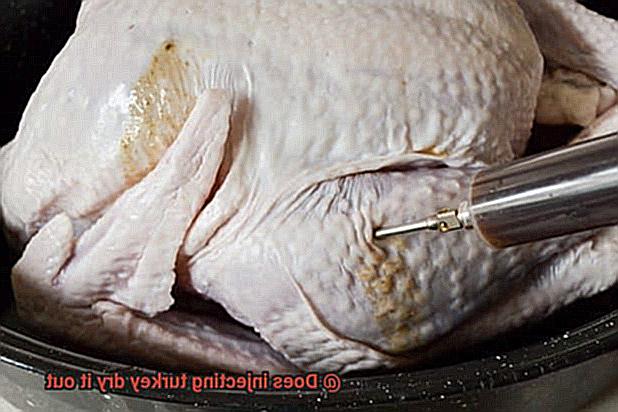
Risks of Over-Injecting a Turkey
Injecting your turkey with a delicious marinade or broth can be a game-changer when it comes to elevating your meal. However, injecting too much can result in several risks that can negatively affect the taste, texture, and safety of your turkey.
One of the most significant risks of over-injecting is that your turkey may lose its natural juices, resulting in a dry and bland taste. Injecting too much liquid can cause the meat to become oversaturated, leading to unappetizing results. Achieving the perfect balance of flavor and moisture is crucial, so it’s essential not to overdo it.
Another risk of over-injecting is that the turkey can become too salty or seasoned. While some people enjoy a heavily seasoned bird, others may find it unpalatable. Additionally, injecting too much salt can also lead to health concerns. It’s vital to follow proper food safety guidelines when injecting your turkey to avoid any potential health risks.
Another issue that can arise from over-injecting is an uneven texture. The injected liquid may not distribute evenly throughout the meat, causing some parts to be overly moist while others remain dry. This makes it challenging to cook the turkey evenly, resulting in an unsatisfactory eating experience.
Lastly, over-injecting can be a waste of time and resources. If you inject too much liquid, you’ll end up spending more time than necessary on the process. Additionally, injectable liquids can be expensive, so it’s vital to use only what’s necessary.
Tips for Successful Injection of a Turkey
As Thanksgiving approaches, many of us are already planning our menus and preparing for the big feast. Injecting your turkey with a marinade or brine can add extra flavor and moisture to the meat, but it’s important to do it correctly. Here are some helpful tips for successful injection of a turkey.
Use a Good Quality Injector:
Invest in a durable injector that has multiple needles and can hold a good amount of liquid. This will make the process easier and ensure that the marinade is evenly distributed throughout the turkey. A cheap injector may break or clog, making it difficult to inject the marinade properly.
Choose the Right Marinade:
Select a marinade that has a good balance of oil, acid, and salt. A marinade with too much acid or salt can dry out the turkey meat, while one with too little oil may not keep the meat moist during cooking. Consider using a homemade marinade made with broth, butter, or other high-moisture ingredients.
Inject in Multiple Places:
Inject the turkey in multiple places, especially in the thickest parts of the meat. This will help the marinade to spread evenly throughout the bird and prevent dry spots. Be sure to inject at different angles and depths to ensure that all parts of the turkey are covered.
Don’t Overdo It:
Avoid over-injecting the turkey as this can lead to a mushy texture and uneven cooking. Inject enough marinade to enhance the flavor and moisture but not so much that it alters the texture of the meat. Remember that injecting is just one way to add flavor – you can also season the skin and cavity of the turkey for extra taste.
Refrigerate Overnight:
After injecting, refrigerate the turkey overnight to allow the marinade to penetrate deeper into the meat. This will also help to keep the meat moist during cooking. Cover the turkey with plastic wrap or foil to prevent it from drying out in the fridge.
f8PEJVOe0jU” >
Conclusion
When it comes to Thanksgiving, the turkey is the star of the show. Injecting your bird with a flavorful marinade may seem like a no-brainer, but there are some important things to consider before you start injecting away.
First and foremost, it’s crucial to understand that not all injections are created equal. The type and amount of injection can have a significant impact on how your turkey turns out. Over-injecting can lead to dry meat that no amount of gravy can save.
That being said, when done correctly, injecting can be a game-changer for your Thanksgiving feast. It allows you to infuse your turkey with delicious flavors and keep the meat moist and tender during cooking.
To achieve optimal results, invest in a high-quality injector and choose the right marinade or brine solution for your tastes. Inject at multiple angles and depths throughout the bird, being careful not to overdo it.
Once you’ve injected your turkey, refrigerate it overnight for maximum flavor penetration. When it’s time to cook, be mindful of temperature and cooking method – slow roasting is typically best for injected turkeys.
With these tips in mind, you’ll be well on your way to impressing your guests with a juicy and flavorful Thanksgiving centerpiece.

